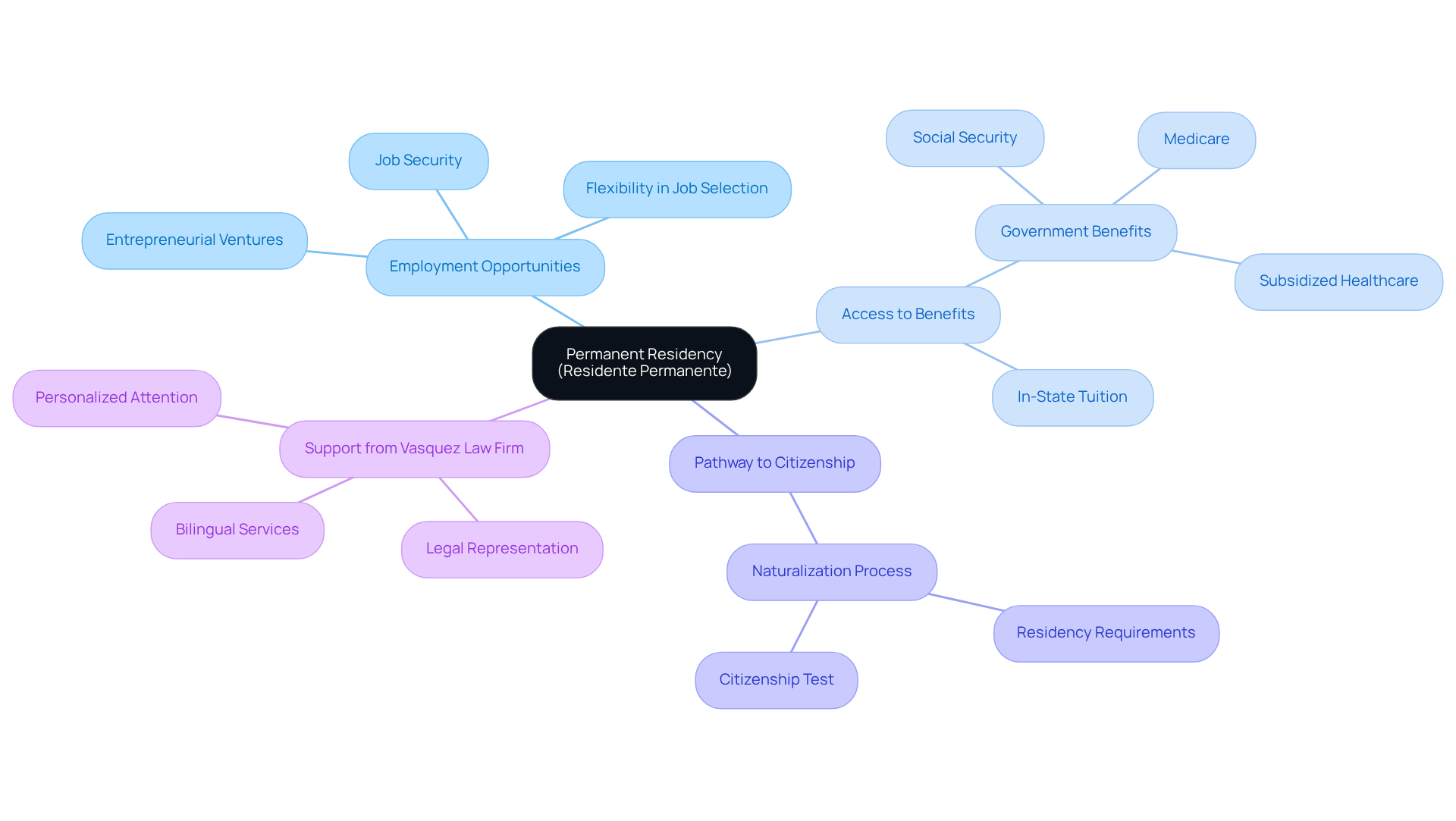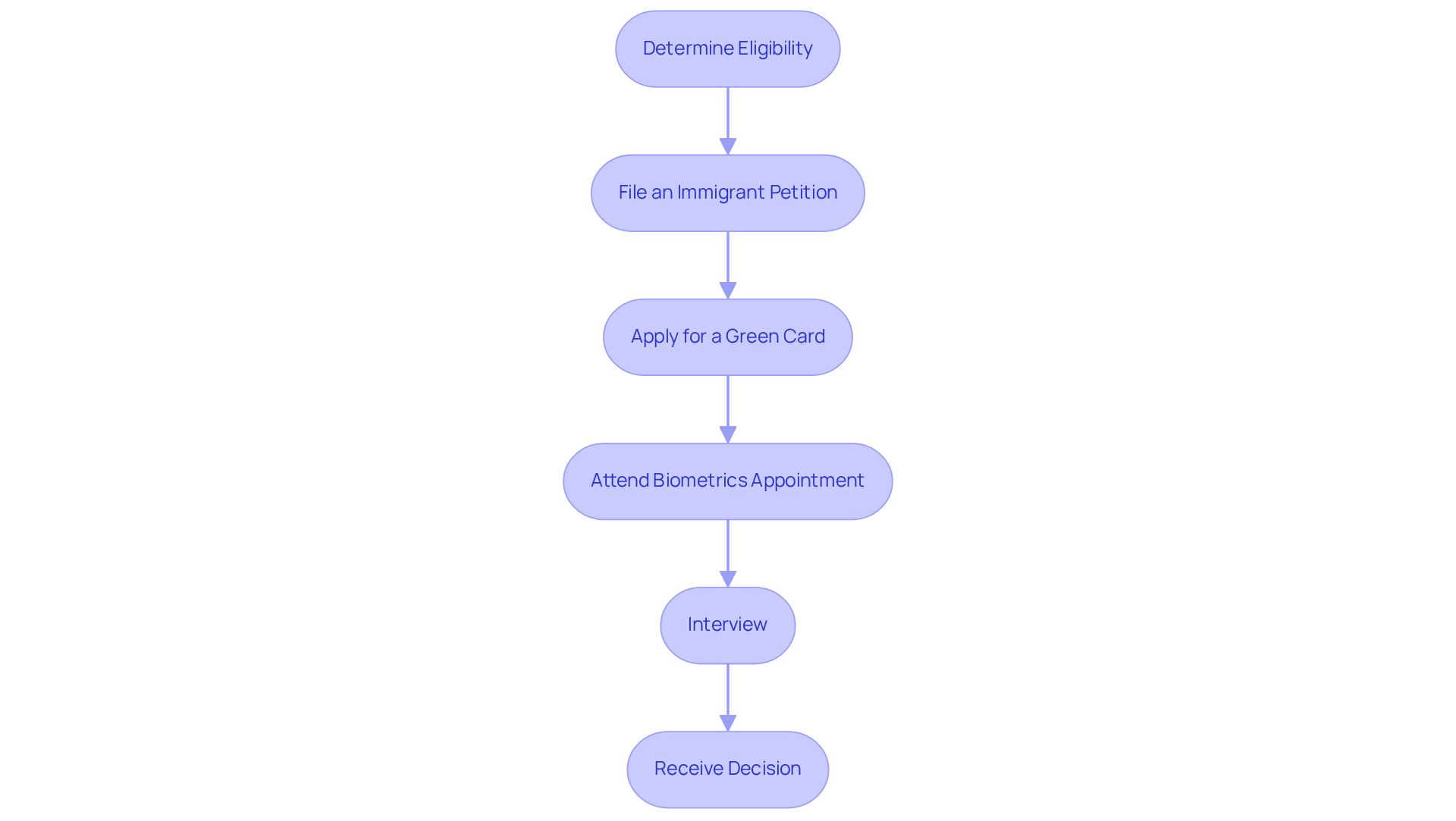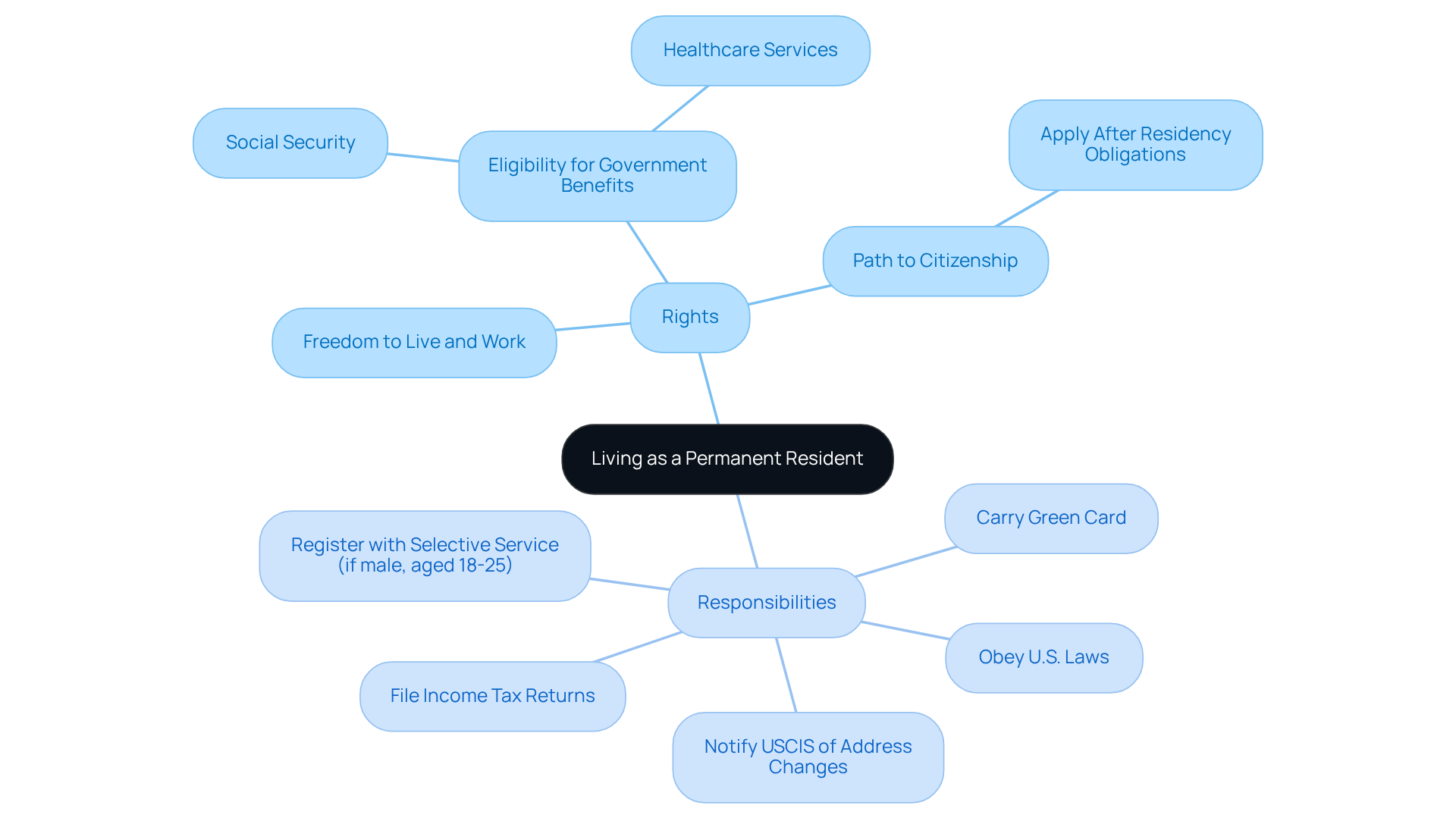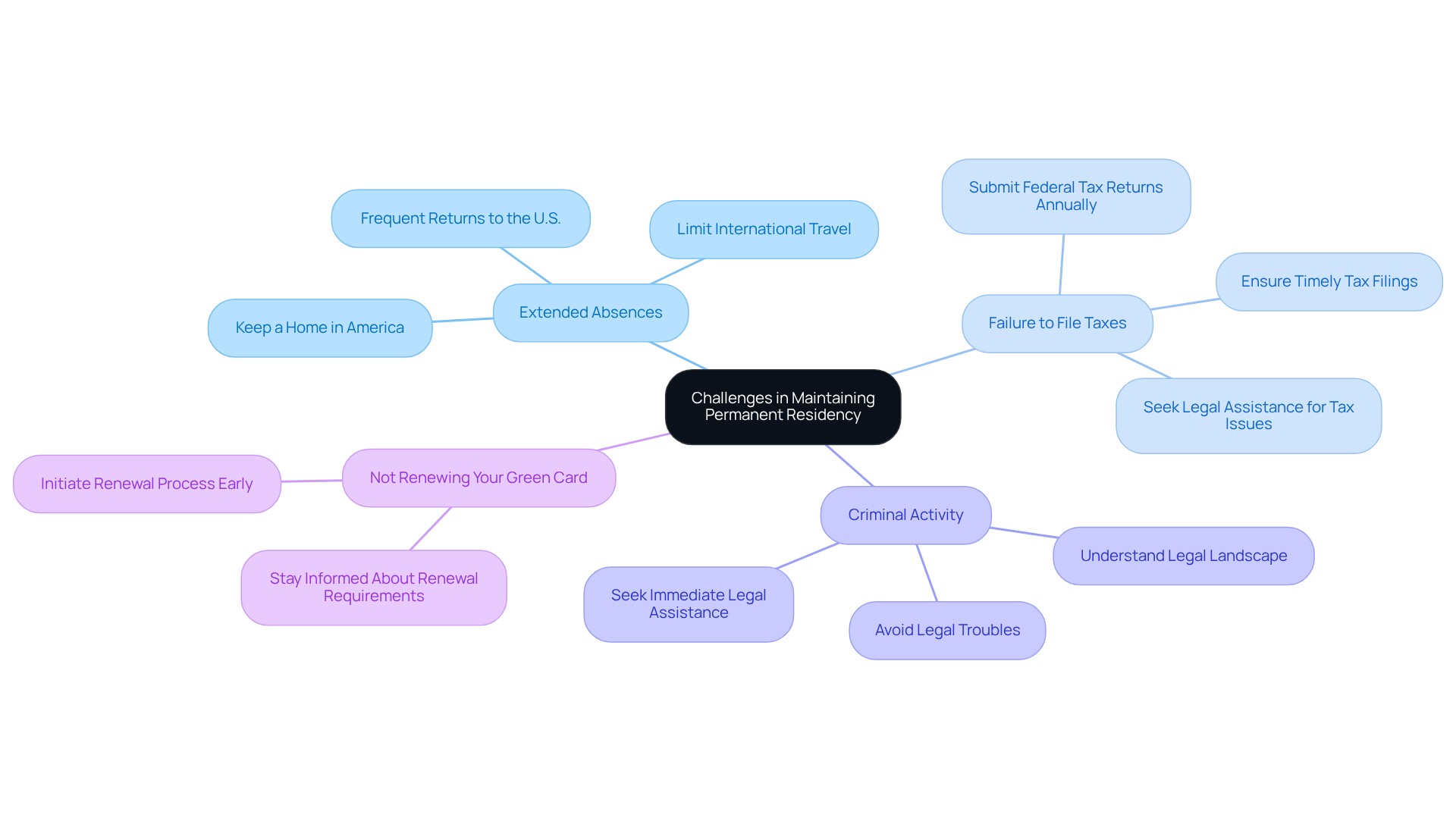Overview
Permanent residency is a vital step for immigrant healthcare workers, allowing you to live and work in the U.S. indefinitely. This status not only provides access to essential benefits and job security, but it also opens the door to potential citizenship. You may be feeling overwhelmed by the application process, but understanding key steps can make a significant difference.
The article outlines important actions you need to take, such as:
- Determining your eligibility
- Filing the necessary forms
It's important to remember that knowing these steps and your responsibilities is crucial for successfully navigating the immigration system. By approaching this journey with the right information and support, you can find the path that leads to a brighter future.
Introduction
Navigating the complexities of U.S. immigration can feel overwhelming, especially for healthcare workers aspiring to achieve permanent residency. The status of residente permanente not only offers the stability essential for thriving in a competitive field but also opens doors to a multitude of opportunities—from unrestricted employment to access to vital government benefits. It's important to remember that while the journey to this coveted status is filled with challenges, there are critical steps that can guide you toward success. How can you, as an immigrant healthcare professional, ensure a smooth transition to permanent residency while steering clear of common pitfalls along the way?
Define Permanent Residency: Key Concepts and Importance
The status of residente permanente, often referred to as holding a Green Card, offers individuals the invaluable opportunity to live and work in the United States indefinitely. This legal status as a residente permanente is essential for non-citizens, offering numerous advantages such as unrestricted employment opportunities, access to government benefits, and a pathway to U.S. citizenship. For immigrant medical workers, obtaining the status of residente permanente is especially crucial. It not only stabilizes their employment status but also empowers them to fully engage in the medical system without the limitations associated with temporary visas.
At Vasquez Law Firm, we deeply understand the unique challenges faced by immigrant healthcare workers. Our expert legal representation in immigration law is here to help you navigate the complex U.S. immigration system with confidence. With over 30 years of experience and a remarkable 98% success rate, our dedicated team is committed to offering personalized attention and aggressive representation tailored to your specific needs. We also provide bilingual services to ensure clear communication and understanding throughout your journey.
The benefits of being a residente permanente go beyond just job security. Residente permanente holders gain access to essential government-sponsored benefits, including subsidized medical services for low-income residents, social security, and Medicare, after meeting specific requirements. This access significantly enhances their quality of life and brings peace of mind regarding medical needs. Moreover, those who are considered residente permanente qualify for in-state tuition rates at public colleges and universities, making higher education more affordable and accessible.
Real-world examples illustrate these benefits effectively. Imagine medical professionals with Green Cards freely exploring various job opportunities across different sectors, negotiating salaries, and even pursuing entrepreneurial ventures without the constraints faced by those on temporary work visas. Statistics reveal that over 14 million people in America currently hold Green Cards, with many more beginning their journey toward achieving residente permanente each year. This growing population underscores the importance of understanding the immigration process and the benefits that come with achieving residente permanente status, especially for those dedicated to working in the healthcare sector. Furthermore, individuals who are residente permanente can seek naturalization after five years of living in the U.S., further reinforcing their long-term commitment to the country. At Vasquez Law Firm, we are here to support you every step of the way.

Outline Application Process: Steps to Achieve Permanent Residency
Navigating the application process for residente permanente can feel overwhelming, but understanding the essential steps can make it more manageable. Here’s a gentle guide to help you through:
-
Determine Eligibility: Start by evaluating your qualifications for long-term status under employment-based categories, especially EB-2 or EB-3, which are often relevant for healthcare professionals like you. It’s crucial to ensure you have the necessary certifications, such as CGFNS for nurses or ECFMG for physicians, to validate your qualifications.
-
File an Immigrant Petition: Your employer will need to submit Form I-140, Petition for Alien Worker, on your behalf. This petition demonstrates that you meet the necessary qualifications for the position. You might find it comforting to know that this petition can be premium processed, allowing for approval in as little as 15 days.
-
Apply for a Green Card: Once your petition is approved, you can file Form I-485, Application to Register Permanent Residence or Adjust Status, if you are already in the U.S. If you are outside the U.S., you will proceed with consular processing. The processing time for Form I-140 is approximately 8.1 months, while Form I-485 typically takes around 8.2 months. Remember, patience is key during this stage.
-
Attend Biometrics Appointment: You will need to provide fingerprints, photographs, and signatures for background checks. This is a standard procedure, and it’s an important step in ensuring your application is secure.
-
Interview: An interview may be required in some cases to verify the details of your application. It’s natural to feel anxious, but this is an opportunity to share your story.
-
Receive Decision: After processing, you will receive a decision on your application. If approved, you will be issued a Green Card, marking a significant milestone in your journey.
Understanding each of these steps is essential for successfully acquiring a residente permanente and can greatly simplify the process. Additionally, if you are a medical worker, you may qualify for expedited processing under Schedule A petitions, which can enhance your chances of a timely approval. Remember, you are not alone in this journey; seeking legal assistance can provide you with the support you need.

Clarify Rights and Responsibilities: Living as a Permanent Resident
As a residente permanente, you enjoy a range of rights and bear specific responsibilities that are vital for your successful integration into U.S. society.
Rights:
- You have the freedom to live and work in the U.S. without restrictions, allowing you to pursue your career in healthcare.
- You are eligible for various government benefits, including Social Security and healthcare services, which can significantly support your well-being.
- After completing residency obligations, you can apply for citizenship in the United States, opening doors to further opportunities and rights.
Responsibilities:
- It's important to remember that obeying all U.S. laws and regulations is imperative, as violations can jeopardize your residency status.
- You are required to file American income tax returns, contributing to the country's economy and public services.
- Always carry your Green Card and present it when requested, as it serves as proof of your legal status.
- Inform USCIS of any address changes to ensure that you receive important communications regarding your status.
Understanding these rights and responsibilities is essential for immigrant workers in the medical field to efficiently manage their new life in the U.S. as a residente permanente. You may be feeling overwhelmed, but by following these guidelines, you can avoid actions that might endanger your long-term immigration status and contribute positively to your community. Remember, you are not alone on this journey; seeking assistance and guidance can help you navigate these responsibilities with confidence.

Identify Challenges: Maintaining Permanent Residency Status
Maintaining lasting immigration status can be challenging for healthcare workers from abroad, and it’s important to acknowledge these concerns. Here are some key issues to be aware of, along with supportive strategies to help you navigate them:
-
Extended absences from America: Spending more than one year outside the country can jeopardize your status as a residente permanente. To reduce this risk, consider keeping a home in America and limiting international travel. Frequently returning to the United States can demonstrate your intent to live here permanently.
-
Failure to File Taxes: As a residente permanente, it is essential to submit federal tax returns annually. Ignoring this responsibility can create complications with USCIS and affect your status. Always ensure timely tax filings, even if no tax is owed, as this shows your commitment to complying with U.S. laws.
-
Criminal Activity: Certain criminal convictions could lead to deportation, so understanding the legal landscape is crucial. It’s wise to avoid actions that might result in legal trouble. If you encounter legal emergencies, such as subpoenas or ICE enforcement actions, remember that you have the right to remain silent and should seek immediate legal assistance. Engaging with legal professionals for guidance can help you navigate these complexities with confidence.
-
Not Renewing Your Green Card: Green Cards must be renewed every ten years. Failing to initiate the renewal process can complicate your status as a residente permanente. Start the renewal process at least six months before your card's expiration to ensure continuous residency.
By recognizing these challenges and taking proactive steps, you can effectively maintain your status as a residente permanente. Your contributions to the U.S. healthcare system are invaluable, and seeking support when needed can help you continue your vital work with peace of mind.

Conclusion
Achieving permanent residency in the United States represents a transformative step for immigrant healthcare workers, offering the chance to live and work free from the constraints of temporary visas. This status not only enhances job security but also opens doors to essential benefits and a pathway to citizenship, ultimately enriching both the individual and the healthcare system.
It's important to recognize the crucial steps involved in obtaining this status. From determining eligibility and filing petitions to understanding rights and responsibilities as a permanent resident, each step requires careful attention. Meticulous adherence to immigration laws and proactive management of residency status are vital for ensuring a smooth transition into life in the U.S. You may be feeling overwhelmed by the unique challenges faced as a healthcare professional; however, there are effective strategies to navigate these hurdles.
Reflecting on the significance of permanent residency, it's clear that this status is not merely a legal formality but a vital component of a fulfilling and stable life for immigrant healthcare workers. By embracing the opportunities it presents and seeking the necessary support, individuals can contribute meaningfully to the healthcare landscape while securing their future in the United States. The journey may be complex, but with determination and the right guidance, achieving and maintaining permanent residency is an attainable goal that opens doors to a world of possibilities.
Frequently Asked Questions
What is permanent residency in the United States?
Permanent residency, often referred to as holding a Green Card, allows individuals to live and work in the United States indefinitely.
What are the advantages of being a permanent resident?
Permanent residents enjoy unrestricted employment opportunities, access to government benefits, and a pathway to U.S. citizenship.
Why is permanent residency particularly important for immigrant medical workers?
For immigrant medical workers, obtaining permanent residency stabilizes their employment status and allows them to fully engage in the medical system without the limitations of temporary visas.
What kind of benefits do permanent residents have access to?
Permanent residents gain access to government-sponsored benefits, including subsidized medical services, social security, and Medicare, after meeting specific requirements.
How does permanent residency affect access to education?
Permanent residents qualify for in-state tuition rates at public colleges and universities, making higher education more affordable and accessible.
What is the process for permanent residents to become U.S. citizens?
Individuals who are permanent residents can seek naturalization after five years of living in the U.S.
How many people currently hold Green Cards in the U.S.?
Over 14 million people in America currently hold Green Cards, with many more beginning their journey toward achieving permanent residency each year.
How can Vasquez Law Firm assist individuals seeking permanent residency?
Vasquez Law Firm offers expert legal representation in immigration law, personalized attention, and bilingual services to help navigate the complex U.S. immigration system.




